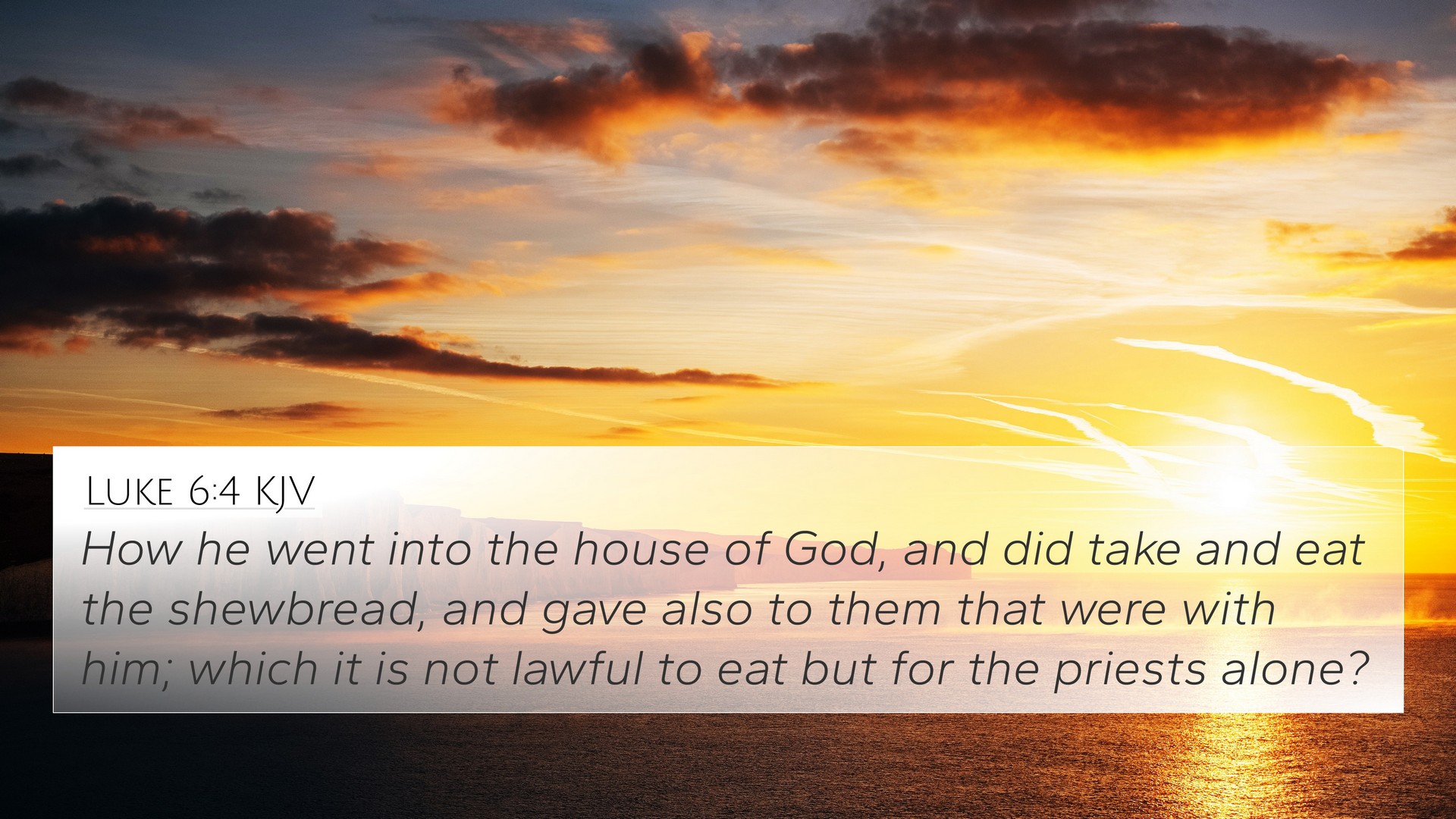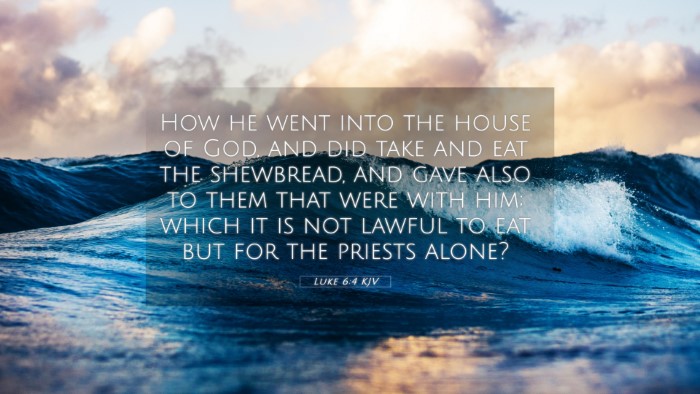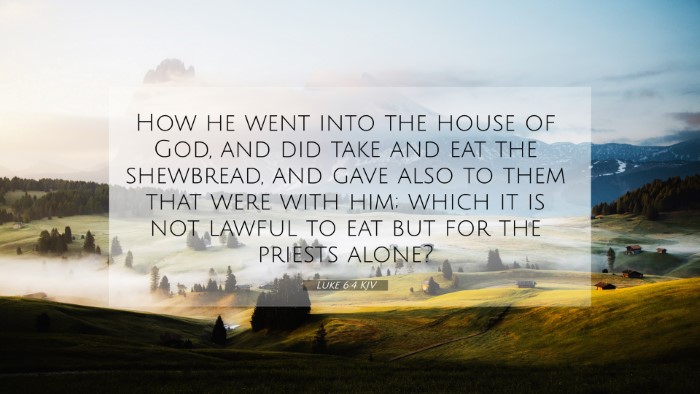Understanding Luke 6:4: A Summary of Biblical Meaning
Luke 6:4 states: "How he went into the house of God, and did take and eat the shewbread, and gave also to them that were with him; which is not lawful to eat but for the priests alone." This verse recounts an incident involving David and his companions, highlighting both the nature of God's law and the flexibility of righteousness.
Commentary Insights:
- Matthew Henry:
Henry emphasizes that this event illustrates the principle that mercy is more important than strict adherence to ceremonial law. It suggests that the needs of individuals can sometimes take precedence over rituals designed for worship.
- Albert Barnes:
Barnes notes that this example from David’s life serves to demonstrate that human necessity can mitigate the strict observance of certain laws. He points out that Jesus uses this story to emphasize His authority over the Sabbath.
- Adam Clarke:
Clarke elaborates on the context of David's actions, suggesting that when faced with hunger and need, even the most sacred laws can be interpreted with consideration for human well-being. This showcases a deeper understanding of divine intention behind the law.
Key Themes and Interpretations:
- Divine Mercy: The verse signifies that God values mercy over ritualistic observances.
- Human Need: It illustrates that in times of urgency, the law must be applied with compassion.
- Authority of Christ: Jesus asserts His authority to interpret the law, indicating a shift from traditional views of the Sabbath.
- Historical Context: The reference to David points to the continuity of divine principles from the Old to the New Testament.
Bible Verse Cross-References:
- 1 Samuel 21:6: The original account of David eating the shewbread.
- Mark 2:26: Another Gospel account referencing the same incident to emphasize Jesus' point about the Sabbath.
- Matthew 12:3-4: Similar to Luke 6:4, highlighting David’s actions regarding the shewbread.
- Exodus 29:32-33: The regulations surrounding the shewbread, outlining its sacredness.
- Hosea 6:6: "For I desire mercy, not sacrifice." This echoes the underlying message of Luke 6:4.
- Romans 14:17: Emphasizes that the kingdom of God is not about eating and drinking but about righteousness, peace, and joy.
- James 2:13: "For judgment is without mercy to one who has shown no mercy." Relates to the theme of mercy over law.
- Luke 11:42: Woe to the Pharisees for neglecting justice and the love of God while being meticulous about the law.
- Galatians 5:13: Use freedom to serve one another in love, which complements the message of mercy and compassion.
- Matthew 15:9: Jesus criticizes traditions that nullify the Word of God, reflecting on the importance of understanding divine intention.
Thematic Bible Verse Connections:
- Understanding God's Law: This involves how the law interacts with human circumstances.
- Mercy Versus Sacrifice: A theme running through both the Old and New Testament, highlighting God’s desire for mercy.
- Authority of Jesus: Connecting Jesus’ actions and teachings to His divine authority over religious law.
- Human Priorities: Understanding that human needs and compassion should guide ethical decisions.
- Old and New Testament Connections: Exploring how the narratives interlink to present a cohesive message of faith.
Bible Cross-Reference Study Tools:
Utilizing tools such as a bible concordance or cross-reference guide can enhance your study of connections between these scriptures. Here are some effective methods for cross-referencing Bible verses:
- Comparative Bible Verse Analysis: Identify parallels and contrasting passages within Scripture for deeper understanding.
- Chain References: Follow a series of related verses to grasp a broader theme or message.
- Cross-Referencing Methods: Use commentaries and references to trace thematic development throughout the Bible.
- Identifying Old and New Testament Links: Focus on connections between key figures and events, like David and Jesus.
- Bible Reference Resources: Employ comprehensive guides that map relationships and themes across the biblical text.
User Intent and Bible Study:
For those seeking to understand how specific verses connect or to find support for a given verse, using cross-referencing can illuminate relationships between scriptures. For example, consider:
- What verses relate to Luke 6:4, as both a reflection on human conditions and divine mercy?
- Finding cross-references for themes like mercy, sacrifice, or authority in the Gospels.
- Exploring the similarities in teachings about the Sabbath and its implications for Christian practice today.
Conclusion:
Luke 6:4 serves as a powerful reminder that while laws and commandments are essential, they must continually be viewed through the lens of love, mercy, and human need. By exploring cross-references and related passages, one can gain a richer understanding of this verse and its implications for faith and practice.



